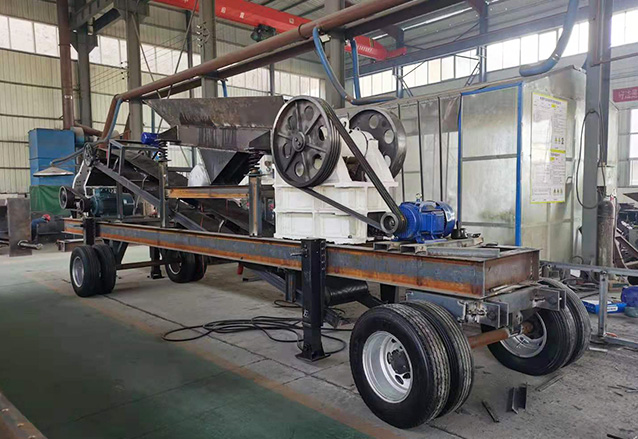


In recent years, the Democratic Republic of Congo (DRC) has witnessed significant industrial growth and development, particularly in the mining sector. As one of the world's leading producers of cobalt, copper, and other valuable minerals, the DRC is increasingly looking for efficient and sustainable solutions to enhance its mineral processing capabilities. One such solution gaining traction is the implementation of mobile crusher lines, which offer a versatile and efficient means of crushing and processing materials on-site.
The Need for Efficient Crushing Solutions in Congo
The DRC's vast reserves of minerals present both an opportunity and a challenge. Traditional fixed crushing plants require substantial infrastructure investment, including transportation logistics, which can be particularly challenging in remote mining areas. Additionally, these plants often struggle with high operational costs and environmental concerns.
Mobile crusher lines address these challenges by providing a flexible, cost-effective alternative. These portable units can be transported directly to the mining site, significantly reducing transportation costs and minimizing the environmental footprint associated with material handling.
Advantages of Mobile Crusher Lines
1. Mobility and Flexibility
One of the primary advantages of mobile crusher lines is their mobility. These units are mounted on tracks or wheels, allowing them to be easily moved from one site to another. This flexibility enables miners to crush materials on-site, eliminating the need for expensive overland transportation of raw materials to distant processing facilities.
2. Cost-Effectiveness
Mobile crushers reduce the overall cost of mineral processing. By eliminating the need for extensive infrastructure and transportation networks, mining companies can achieve significant savings. Furthermore, mobile units often have lower operational and maintenance costs compared to traditional stationary plants.
3. Environmental Benefits
Mobile crushers contribute to environmentally sustainable mining practices. By processing materials on-site, they minimize dust and noise pollution associated with transportation. Additionally, they reduce carbon emissions by decreasing the distance materials must be transported.
4. Increased Productivity

Modern mobile crushers are equipped with advanced technology that enhances productivity. Features such as automated controls, real-time monitoring, and high-capacity crushing chambers ensure efficient operation even in demanding conditions. This results in higher throughput and better quality aggregates.
5. Versatility
Mobile crusher lines can handle a wide range of materials, including hard rock, soft rock, and various types of ores. They are suitable for both primary and secondary crushing applications, making them versatile tools for any mining operation.
Case Study: Implementation in Congo
A prominent mining company operating in the DRC recently integrated a mobile crusher line into its operations. The company faced significant challenges due to the remote location of its mining sites and the rugged terrain. Traditional crushing methods were not only costly but also inefficient.
By adopting a mobile crusher line, the company was able to process materials directly at the extraction point. The mobile units were equipped with jaw crushers for primary crushing and cone crushers for secondary crushing, ensuring a two-stage crushing process that maximized efficiency. The result was a significant reduction in transportation costs and faster turnaround times for processed materials.
Furthermore, the mobile crushers were powered by diesel generators, which provided consistent energy supply despite the lack of reliable grid infrastructure in the area. The use of advanced automation and monitoring systems ensured optimal performance and minimal downtime.
Future Prospects
The success of mobile crusher lines in Congo underscores their potential for broader adoption in the country's mining sector. As technology continues to advance, we can expect further improvements in efficiency, cost-effectiveness, and environmental sustainability. Integration with renewable energy sources, such as solar power, could further reduce the carbon footprint of mobile crushing operations.
Moreover, ongoing research into autonomous mobile crushers holds promise for even greater efficiency and safety. Self-driving mobile units could navigate complex terrains without human intervention, enhancing productivity while reducing labor costs and risks.
Conclusion
Efficient crushing solutions, particularly mobile crusher lines, offer a transformative approach to mineral processing in the Democratic Republic of Congo. Their mobility, cost-effectiveness, environmental benefits, and versatility make them an ideal choice for the country's dynamic mining industry. As Congo continues to harness its mineral wealth, mobile crusher lines will play a crucial role in achieving sustainable and profitable mining operations.